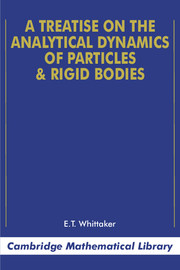Book contents
- Frontmatter
- Contents
- Foreword by Sir William McCrea, FRS
- Preface to the fourth edition
- CHAPTER I KINEMATICAL PRELIMINARIES
- CHAPTER II THE EQUATIONS OF MOTION
- CHAPTER III PRINCIPLES AVAILABLE FOR THE INTEGRATION
- CHAPTER IV THE SOLUBLE PROBLEMS OF PARTICLE DYNAMICS
- CHAPTER V THE DYNAMICAL SPECIFICATION OF BODIES
- CHAPTER VI THE SOLUBLE PROBLEMS OF RIGID DYNAMICS
- CHAPTER VII THEORY OF VIBRATIONS
- CHAPTER VIII NON-HOLONOMIC SYSTEMS. DISSIPATIVE SYSTEMS
- CHAPTER IX THE PRINCIPLES OF LEAST ACTION AND LEAST CURVATURE
- CHAPTER X HAMILTONIAN SYSTEMS AND THEIR INTEGRAL-INVARIANTS
- CHAPTER XI THE TRANSFORMATION-THEORY OF DYNAMICS
- CHAPTER XII PROPERTIES OF THE INTEGRALS OF DYNAMICAL SYSTEMS
- CHAPTER XIII THE REDUCTION OF THE PROBLEM OF THREE BODIES
- CHAPTER XIV THE THEOREMS OF BRUNS AND POINCARÉ
- CHAPTER XV THE GENERAL THEORY OF ORBITS
- CHAPTER XVI INTEGRATION BY SERIES
- INDEX OF AUTHORS QUOTED
- INDEX OF TERMS EMPLOYED
Foreword by Sir William McCrea, FRS
Published online by Cambridge University Press: 05 August 2012
- Frontmatter
- Contents
- Foreword by Sir William McCrea, FRS
- Preface to the fourth edition
- CHAPTER I KINEMATICAL PRELIMINARIES
- CHAPTER II THE EQUATIONS OF MOTION
- CHAPTER III PRINCIPLES AVAILABLE FOR THE INTEGRATION
- CHAPTER IV THE SOLUBLE PROBLEMS OF PARTICLE DYNAMICS
- CHAPTER V THE DYNAMICAL SPECIFICATION OF BODIES
- CHAPTER VI THE SOLUBLE PROBLEMS OF RIGID DYNAMICS
- CHAPTER VII THEORY OF VIBRATIONS
- CHAPTER VIII NON-HOLONOMIC SYSTEMS. DISSIPATIVE SYSTEMS
- CHAPTER IX THE PRINCIPLES OF LEAST ACTION AND LEAST CURVATURE
- CHAPTER X HAMILTONIAN SYSTEMS AND THEIR INTEGRAL-INVARIANTS
- CHAPTER XI THE TRANSFORMATION-THEORY OF DYNAMICS
- CHAPTER XII PROPERTIES OF THE INTEGRALS OF DYNAMICAL SYSTEMS
- CHAPTER XIII THE REDUCTION OF THE PROBLEM OF THREE BODIES
- CHAPTER XIV THE THEOREMS OF BRUNS AND POINCARÉ
- CHAPTER XV THE GENERAL THEORY OF ORBITS
- CHAPTER XVI INTEGRATION BY SERIES
- INDEX OF AUTHORS QUOTED
- INDEX OF TERMS EMPLOYED
Summary
Edmund Taylor Whittaker (1873–1956) was one of the most remarkable mathematical polymaths of modern times. He was a professional mathematician of outstanding scholarship and originality in mathematical analysis and in the mathematics of general relativity and of several other parts of mathematical physics, as well as of classical mechanics. For several years he was a professional astronomer directing an observatory. He then became a celebrated head of a mathematical department. He was a pioneer of the teaching of numerical mathematics and of mathematical statistics. He was a leading historian of mathematical physics.
As a person, Whittaker was without doubt the most influential figure of his time in the mathematical community of the British Isles. This was partly because of the singular sequence of his appointments. As a young lecturer in Cambridge from 1896 to 1906 he had as colleagues or pupils nearly all the leading British mathematicians of two generations. As Royal Astronomer of Ireland from 1906 to 1912, helped by his temperamental affinity, he gained intimate knowledge of the Irish academic world at what proved to be for it a notable vintage period. Then in Edinburgh from 1912 to 1946 he directed what became the leading individual British school of mathematics – those in London, Oxford and Cambridge being more fragmented; there a high proportion of all British mathematicians came under his influence in one capacity or another. Also he became personally acquainted with leading mathematicians throughout the world.
- Type
- Chapter
- Information
- A Treatise on the Analytical Dynamics of Particles and Rigid Bodies , pp. xiii - xviiiPublisher: Cambridge University PressPrint publication year: 1988



